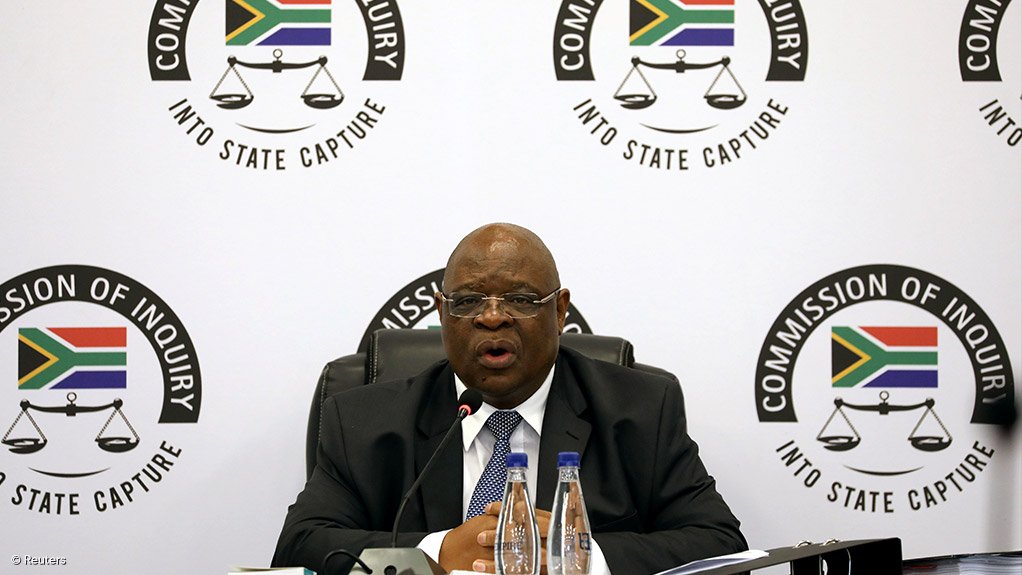A clearly pained Deputy Chief Justice Raymond Zondo on Monday heard argument he had allowed an impression that the eponymous commission of inquiry would be unfair and persecutory to former president Jacob Zuma.
Advocate Muzi Sikhakhane told Zondo he had made all too human “mistakes” in the manner he responded to the testimony of those implicating Zuma in state capture and this had led the former president to believe he would be coming “to a slaughterhouse” should he take the stand.
The list of witnesses who have appeared before the commission – from former ministers Barbara Hogan and Trevor Manuel to MP Vytjie Mentor and government spokesperson Themba Maseko – had cemented this perception, he said.
The morning’s proceedings began with Zondo reading a statement in which he outlined his every past interaction with the former president, who is demanding his recusal before he testifies before the commission.
As Zuma sat and listened, Zondo testified they had never been friends.
“That is not accurate,” Zondo said, as he enumerated the times over the past two and a half decades that the pair’s paths had crossed.
Zondo said he paid his respects when one of Zuma’s wives died “18 or 20 years ago”, but Zuma had never attended any of his family funerals or events such as birthday celebrations.
In 1996, a year before he became a judge, he had met with Zuma because he was representing a client as a lawyer who wanted to bring an application against him.
However, Zondo said, he never brought the application because he was then appointed to the bench. He added that Zuma had never previously sought his recusal from the bench in any of the matters embroiling the former head of state.
Zuma moved for Zondo’s recusal as head of the commission after the judge, clearly exasperated with his refusal to testify before the body, issued summons on October 9 for him to appear.
Following Zondo’s opening statement on Monday morning, Zuma’s lawyer, advocate Muzi Sikhakhane, said he was not accusing Zondo of being partial or lacking integrity.
Instead, he said he needed to criticise the deputy judge president for, through his comments in commission sittings at times, contributing to a perception that has gained public traction that Zuma is the politician responsible for the corruption and disarray besetting South Africa.
The former president, who was present at the hearing, was reasonably justified to be “fearful” of appearing in a forum that had reinforced perception that he belonged in prison, Sikhakhane continued.
“You may have created an environment that enforces in his mind, reasonably so, that this forum is an extension of the narrative about him that everything that went wrong in South Africa is attributable to him,” he said.
Zondo called for a tea break before Sikhakhane was about to list the remarks that he would argue furthered this fear and perception.
He had earlier said that it was expected of presiding officers to remain impassive even when listening to harrowing testimony about the rape of a toddler.
Sikhakhane said the fact that two courts had barred Zuma from fulfilling his normal presidential duty, as set out in the Constitution, of appointing the head of a commission of inquiry in the case of the Zondo one probing state capture, had already created the grounds for the former president’s fears.
After tea, the advocate went further and said the selection of witnesses who had been called by the commission and the questions posed to them by Zondo appeared designed to arrive at a particular conclusion that paint Zuma as guilty.
He singled out a question Zondo had put to former public enterprises minister Hogan about executive interference at Eskom.
Zondo interjected to say that he had posed the question to establish whether the impression Hogan’s statement created was indeed what she was inferring.
But Sikhakhane insisted that the remark suggested a particular mindset.
“It is a mind that is inclined to agree with a particular witness about another who is not there.
“I’m asking you to do something very difficult – it is difficult for me, it is difficult for you – in the heat of things and in the outrage you feel because you are a human, is not because you are a bad person, but there is a line you cross.”
The judge countered that Sikhakhane should consider that perhaps he had merely indicated a provisional acceptance of the testimony of a particular witness “until I hear the other side, until I hear what has happened”.
But Sikhakhane said the answer only offered succour on an abstract, intellectual level, not to a witness sitting before him.
“Here is where I part ways with your answer… it is no comfort from a judge to make that comment and give the explanation you are giving me… it is sound but in an environment where you sit in that powerful position with people who sit here, others as heroes and others as accused, those accused persons do not feel that statement you made you say it.
“For them it is not an intellectual engagement, they are being accused.”
The former president had reason to fear that he would not be treated fairly.
He said Zuma had never intended to defy the commission and refuse to appear, casting this as another false perception about him.
Zondo in late October issued an extraordinary statement in which he revealed that in the 1990s he had a child with the sister of Thobeka Madiba, one of Zuma’s wives, but said this did not disqualify him from presiding over his testimony.
EMAIL THIS ARTICLE SAVE THIS ARTICLE
To subscribe email subscriptions@creamermedia.co.za or click here
To advertise email advertising@creamermedia.co.za or click here











